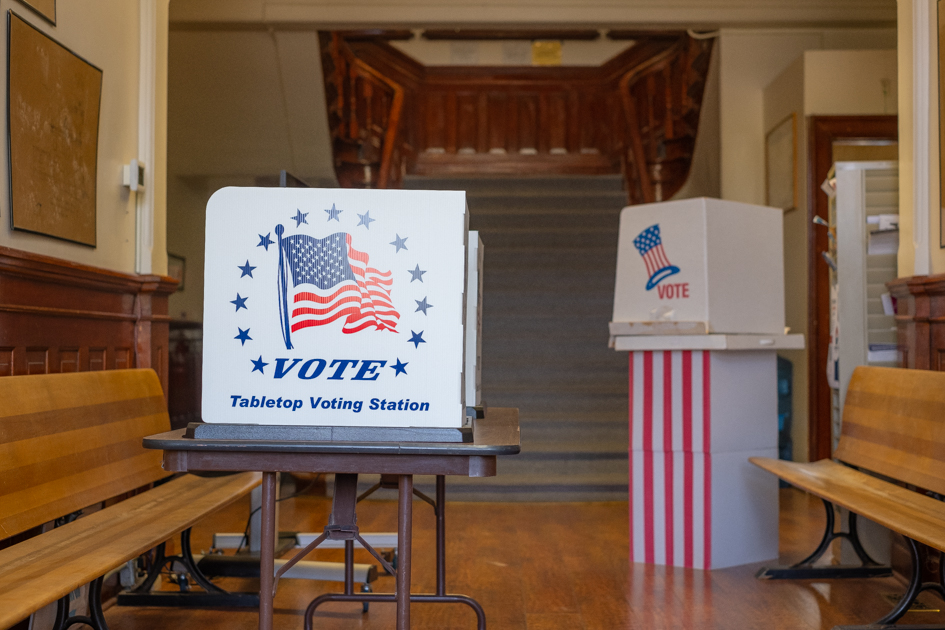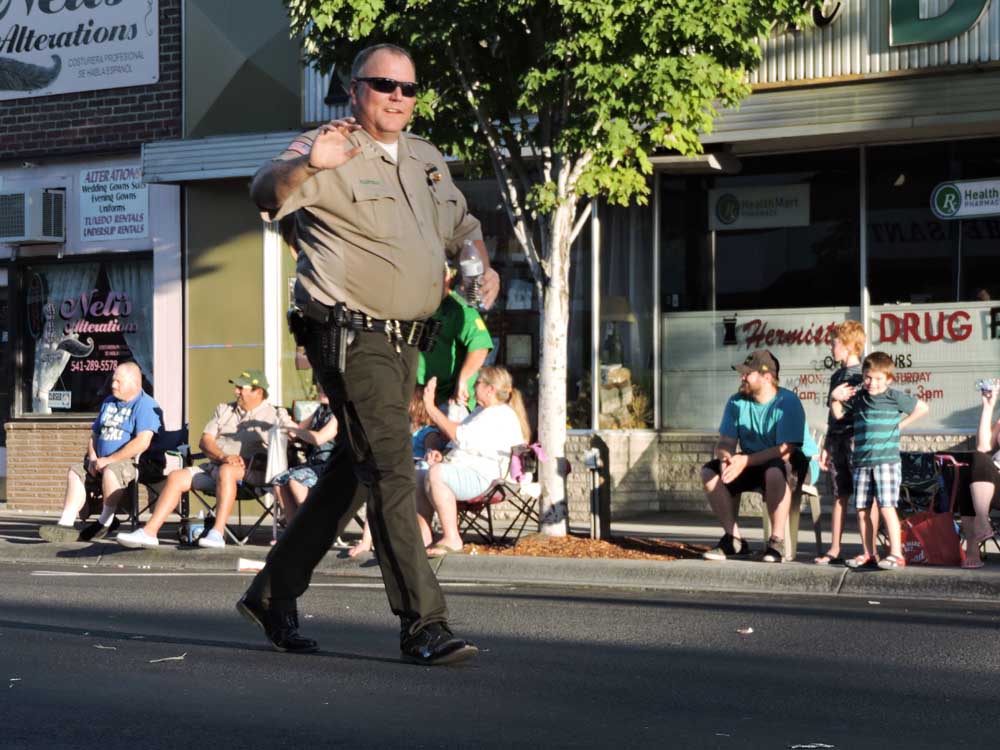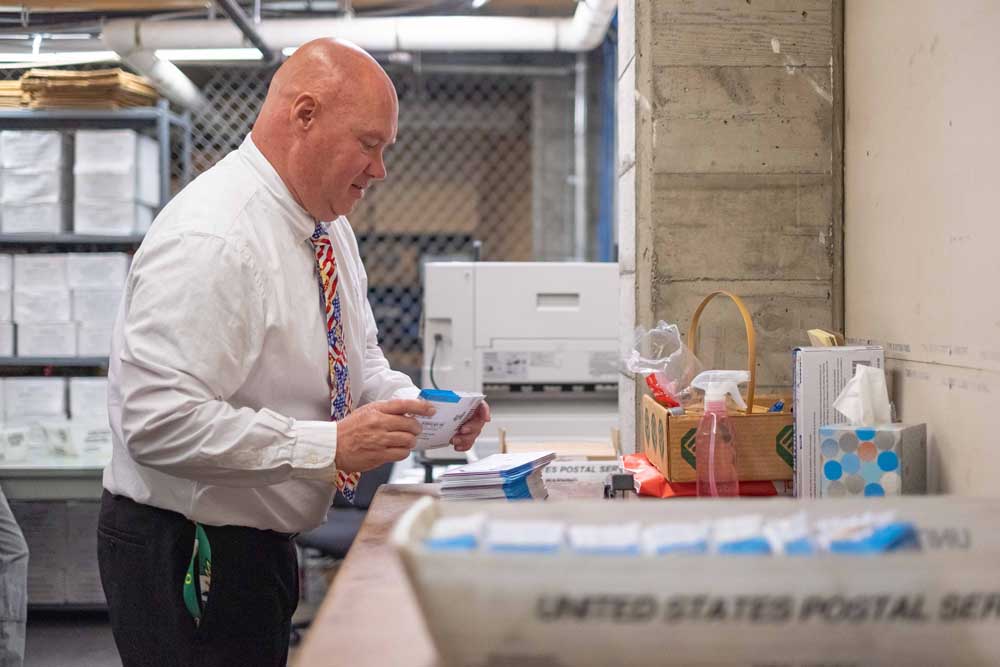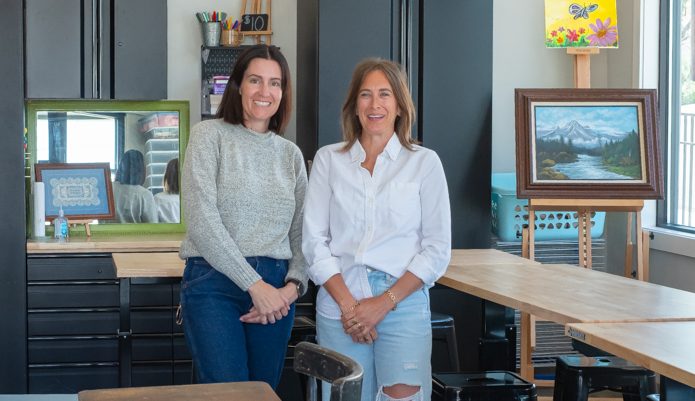‘Alex’s Story’: Amid grief, mom who lost son to fentanyl overdose educates students
Published 6:00 am Saturday, November 4, 2023
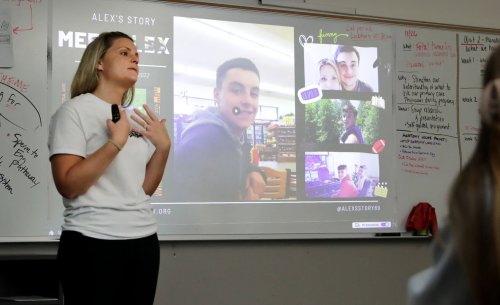
- Tami Garcia, the mother of Alex Crus Garcia, shares her son’s fentanyl overdose story Oct. 26, 2023, with students at South Medford High School.
MEDFORD — A hutch in the corner of a Medford home contains keepsakes from the life of Alex Crus Garcia.
His high school diploma and graduation tassel. Photos of Alex with his family. Glazed sculptures he made in elementary school: one is of the Batman logo, another is of him and his family members on the couch. Letters and artwork are tucked in drawers.
Alex, a graduate of South Medford High School, died at age 19 of a fentanyl overdose at a friend’s house in August 2022.
Within two months, his mother, Tami Garcia, a talent acquisition supervisor at Asante, had registered a nonprofit to shine a searing light on the drug and its dangers. She called it Alex’s Story.
In recent years, fentanyl — a supercharged synthetic opioid — overtook heroin as the dominant drug in the local illicit supply. The federal Centers for Disease Control and Prevention estimates fentanyl at “up to 50 times stronger than heroin and 100 times stronger than morphine.”
Alex is one of more than 50 people who died in Jackson County last year from a fentanyl-related overdose, according to figures from the county Medical Examiner’s Office. More than 70 fatal overdoses occurred overall.
In 2020, of 41 overdoses in the county, 13 involved fentanyl. In 2016, of 25 overdoses, none involved fentanyl.
In 2021, over 80,000 people died in the U.S. from opioid overdoses; synthetic opioids were implicated in almost 88% of those deaths, according to the CDC.
Fentanyl is consumed on its own and often mixed with heroin or methamphetamine. It can also be pressed into pills and disguised as common medications. That’s what Alex’s family believes happened to him — that he took what he probably thought was a pharmacy-grade pill for pain or anxiety that turned out to be a fentanyl-laced counterfeit.
Alex, who suffered from anxiety and depression, had been on a prescription antidepressant, though didn’t taken it consistently, his mom said. His parents knew he smoked marijuana and drank alcohol. He reassured them that he did not take pills at parties with his friends, Tami said.
After he died, other parents who had lost children to overdoses reached out to the Garcias.
“We were completely blown away that this kept happening,” Tami said.
In March, Tami began speaking at local schools to share her son’s story — who he was, why he died. Sometimes she is accompanied by her husband, Tomes Garcia; her mother; or the nonprofit’s volunteers. She started with health classes in Medford schools and recently expanded into the Grants Pass School District. Tami plans to start speaking at Medford’s middle schools.
“I’ve cried in front of the kids, nearly every single time,” she said.
Tami gives students fentanyl facts that they might not know — such as that a person can die from a mere two milligrams, an amount that resembles 10 to 15 salt grains, according to the U.S. Drug Enforcement Administration.
“Essentially, any amount can kill you at this point because it’s becoming so strong,” Tami said.
She explains how the drug is manufactured and distributed, how it can enter a person’s system; even smoking marijuana from an unknown source can expose them to fentanyl. She teaches students what an overdose looks like and what to do about them, including how to administer Narcan, a nasal spray that can reverse opioid overdoses.
She warns them not to carry Narcan just to give themselves permission to use drugs. “We always say to not risk it,” she said.
At the end, she hands out swag bags with fentanyl-awareness bracelets, stickers, sunglasses, pens and candy.
Tami and Tomes recently met with two classes at Gladiola High School, an alternative education high school in Grants Pass. Last school year, a student of the district fatally overdosed on fentanyl in circumstances similar to Alex’s: He took a pill, apparently without knowing what it was, and it killed him.
Michael Shunk, the principal at Gladiola, said fentanyl is “a huge worry in our community.”
“We’ve heard anecdotal stories of how prevalent it is and how dangerous it is, and the more education we can do on this, the more lives we can save,” Shunk said.
Amy Herbst, assistant director of student wellness at Medford School District, said, “This epidemic has just come upon our community so swiftly that we’re all just scrambling to respond.”
Tami’s outreach, she said, has “really filled in a gap for a lot of us.”
After the presentations Herbst saw at Central Medford, students walked up to Tami and hugged her.
This is a common response, Tami said. Students often share with her their own encounters with fentanyl — how substance use has destroyed their family, how people they knew and loved overdosed and died. A girl once told Tami that she’s in foster care because her dad is hooked on fentanyl.
“One of the last schools I went to, I had a student tell me that they had been taking fentanyl and they were, like, 60 days clean,” Tami said.
This month marks the one-year anniversary of Alex’s Story. For the Garcias, the nonprofit is a way to get their message out and to keep Alex’s name and memory alive. “He was such a beautiful person,” Tami said.
As the nonprofit has evolved, so has a garden in the Garcias’ backyard that Tami started as a therapy project days after her son’s death. Tomatoes, zucchinis, peppers are enclosed within a fence she built with wood from a prior fence. Soldered into a sign above a gate are the words “welcome to Alex’s Garden,” “in dedication to our moe-moe” (his nickname) and “we love you!!!”
The family is haunted by questions that investigators haven’t answered. Who gave Alex the pill that killed him? What happened to his phone and computer? How and why did someone access his social media accounts and wipe away information?
The Garcias still remember the Alex that played football, devoured movies and comic books, loved his mom and dad, his sister and brothers, his dogs. Tami can’t stand the words “move on” or “move forward.” She doesn’t think she can, and even if she could, it wouldn’t feel right, she said.
“We’re surviving,” Tami said. “I don’t know if I would call it anything different.”
To sponsor a child’s education around fentanyl or otherwise contribute to the cause, visit the website.


